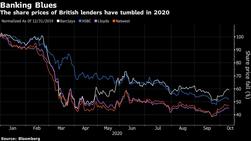
After nine months of restrictions, the Bank of England offered UK banks a possible path to normality Thursday when it said it was easing its de facto ban on dividends.
The move is a victory for HSBC Holdings Plc, Standard Chartered Plc and other large British lenders that scrapped dividends in March, when regulators said banks needed to conserve capital to cover losses from COVID-19. Banking executives had lobbied vocally for the return to payouts, including NatWest Group Plc chairman Howard Davies, who said in July the sector isn’t investible otherwise.
READ MORE: HSBC HK shareholders mull suit over dividend suspension
“This is a sensible decision from the regulator,” John Cronin, an analyst at Goodbody, said. “It was important in the context of sustaining and stimulating investor interest in the sector.”
Standard Chartered welcomed the move and said it would consider resuming shareholder returns on Feb 25, when it reports full-year earnings. Barclays and HSBC declined to comment on the changes. NatWest Group Plc said it noted the announcement and said a decision on dividends would be taken at the year’s end.
Standard Chartered Plc welcomed the move and said it would consider resuming shareholder returns on Feb 25, when it reports full-year earnings
Share slide
Still, bank shares slid in Friday London trading, paced by NatWest’s 5 percent drop. The renewed prospect of a no-deal Brexit hit the broader stock market as negotiations between the UK government and the European Union took a turn for the worse.
Concern that the Bank of England’s move comes with strings attached may also be weighing on the shares. Dividends will be capped at about 25 percent of quarterly profit, among other rules that Goodbody’s Cronin described as “very restrictive.”
HSBC and Standard Chartered, which are the least dependent on the British market of the big five banks, posted the smallest declines after spending much of the Hong Kong trading day in positive territory. Retail investors in Hong Kong, who had long bought HSBC and Standard Chartered shares for their dividend payouts, had been as vocal as the bank executives in their displeasure.
The BOE approach - despite the caveats and caution of its statement - contrasts with developments in the European Union, where watchdogs are leaning towards extending their own de facto dividend ban well into next year, though with some exceptions for the strongest lenders, according to people familiar with the matter.
Some EU regulators are concerned that if banks resume payouts, they may not be strong enough to resist another round of taxpayer bailouts if pandemic-related loan losses worsen.
The BOE’s Prudential Regulation Authority struck a different tone.
“An extension of the exceptional and precautionary action taken in March is not necessary,” the PRA said. “There is scope for banks to recommence some distributions should their boards choose to do so, within an appropriately prudent framework.”
The divergence, which comes as Britain prepares to leave the European Union’s single market, underlines the different approaches regulators have struck even as they battle the economic effects of a global pandemic. In the US, the Federal Reserve allowed banks to continue to pay dividends even as they restricted lenders from increasing them above second-quarter levels, and banned share buybacks.
ALSO READ: Dividend cuts no big deal for institutional investors
The PRA will subject boards to regulatory “guardrails” when setting their 2020 dividends, before returning to its normal approach during 2021. Payments should not:
exceed 20 basis points of risk-weighted assets at the end of 2020; or
exceed 25 percent of cumulative quarterly profits over 2019 and 2020 after deducting shareholder distributions;
create excess vulnerabilities to stress or impede a bank’s ability or willingness to support households and businesses.
The regulator also said banks should exercise a “high degree of caution and prudence” on cash bonuses for senior staff.
“The measures are in fact very restrictive - however, the message around the path to normalization in 2021 is helpful,” said Goodbody’s Cronin.


